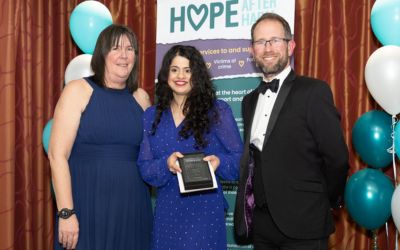Building Bridges and Making a Difference in the Community

Neelam receiving Community Impact Award 2024
Our colleague Neelam is a Community and Diversity Officer (CADO) for Milton Keynes. Her dedication to fostering strong relationships within the communities of Milton Keynes has recently been recognised with a Community Impact Award at the Thames Valley Criminal Justice Awards. But what exactly does a CADO do, and how does Neelam’s passion translate into real-world impact?
How long have you been in your role at Thames Valley Police, and can you explain what a typical day might look like? Tell us more about your role as a CADO?
I first joined TVP in 2008 as a Prevent Engagement Officer in Aylesbury. In 2013 I took a leave of absence to focus on my children and family. I then returned as a volunteer in 2021 and started as a CADO in February 2022. It is difficult to describe a typical day in my current role because there is not one!
My role encompasses a range of activities, from dealing with critical incidents and writing Community Impact Assessments, to advising senior management on community engagement. I also manage community tensions and work closely with our Neighbourhood Policing Teams to attend key community events. Much of my work focuses on helping the Local Policing Area (LPA) deliver on its key priorities around knife crime, violence against women and girls, as well as building community resilience so that we can better withstand the fallout from critical incidents.
How do you feel you are making a difference in Milton Keynes?
I am truly passionate about ensuring that as a force we have a better understanding of all our local communities, so that we can make policing more responsive to their needs. I believe my role in community engagement and building trust and confidence plays a part in this. This is the cornerstone of policing by consent and one of the things that makes the police forces in this country so special, and one of the best policing systems in the world.
Tell us about some of the community projects you get involved in:
There are a variety of projects I get involved in as part of my role. For example, I organise for members of the community to attend our stop and search scrutiny panels. During these meetings, they have the opportunity to watch body-worn footage of stop and search operations and provide feedback on it. This helps us with transparency around stop and search and also gets our communities involved. Alongside my neighbourhood officers, I’ve organised knife crime awareness sessions with young people and community groups to make them aware of the dangers of carrying a knife. I’ve also been involved in delivering TVP’s Race Action Plan, to help build trust and confidence with our ethnic minority communities.
 What skills from previous roles and outside of work help you as a CADO?
What skills from previous roles and outside of work help you as a CADO?
Being tenacious and thick-skinned are two of the most important skills to have in this role. Growing up in a large family with five sisters and dozens of cousins definitely helped me hone those skills! Community engagement is an art, not a science. Things don’t always go smoothly, no matter how hard you try. It takes time to build trust with communities who may historically have a negative view of the police. The saying “success is how you bounce back when you fall down” comes to mind.
What did your family think about you receiving the award? They’re incredibly proud! It was especially rewarding because it sparked my children’s interest in all the different things police do beyond arresting criminals!
What would you say to someone considering joining policing?
I’d say to them to be open-minded and give it a go. Policing is one of those professions that’s always under enormous public and media scrutiny, and rightly so. But it’s also one of the most rewarding professions there is. It offers you the ability to make a real positive difference to the lives of so many people, and no two days are ever the same!
Do you want to build bridges, strengthen trust, and make a real difference in your community? Discover a wide variety of opportunities available through our vacancies portal, or learn more by visiting our Roles page.


 Facebook
Facebook
 Twitter
Twitter
 Linkedin
Linkedin
 Instagram
Instagram